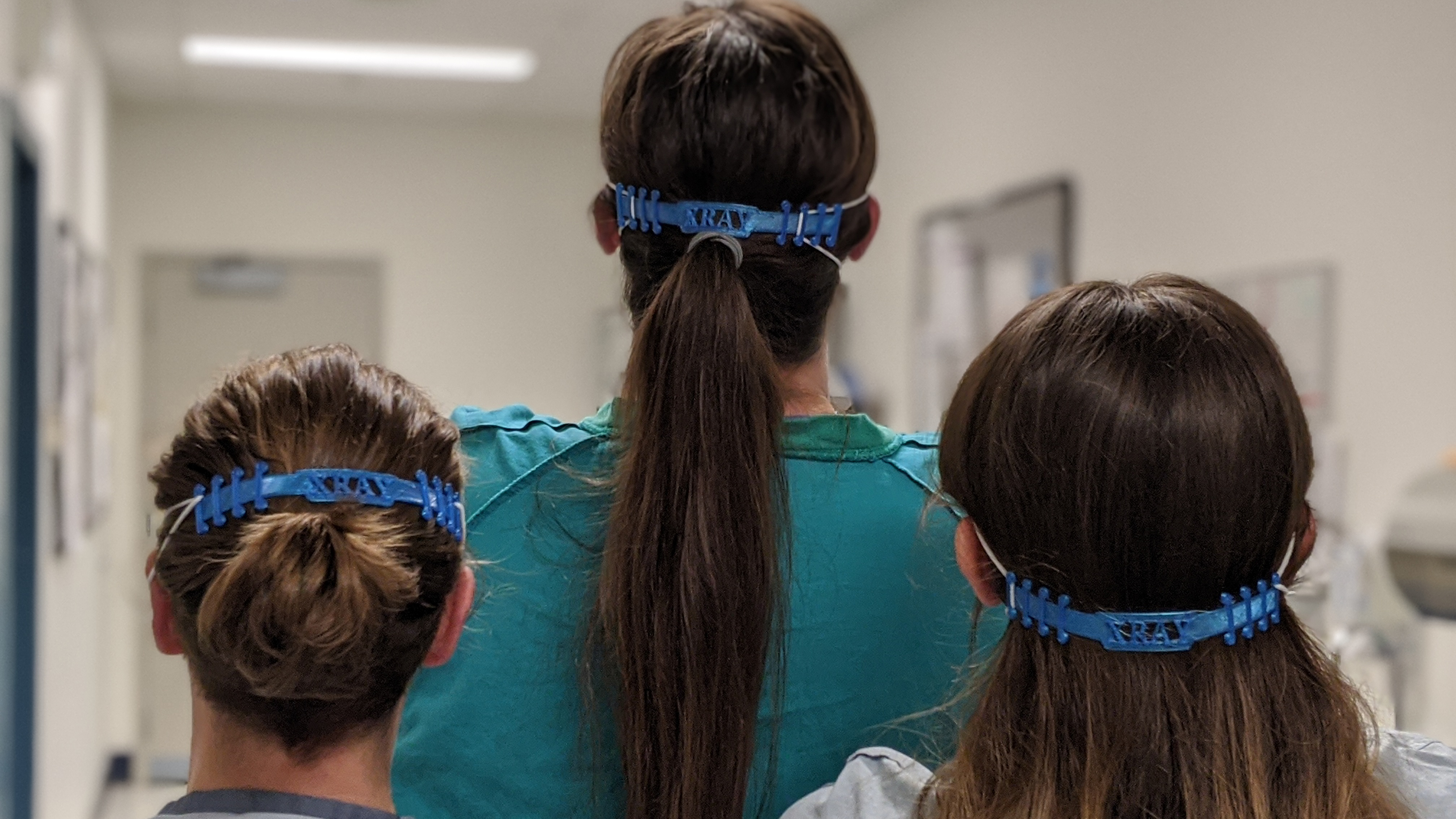I just wanted to help
Tia Lalani - 5 June 2020

Augustana chemistry technician and alumnus David King ('03) printed these "ear saver" straps for diagnostic imaging technicians at the University of Alberta Hospital after learning that their ears had been rubbed raw from wearing traditional face masks with elastic straps. Photo courtesy of David King.
When the COVID-19 pandemic forced the University of Alberta campuses to close, turning to remote delivery of classes and labs, Augustana lab technician David King just wanted to help.
“On Thursday I was setting up a lab, and by the following Monday I was helping deliver that same lab remotely,” he explained. “The first two weeks of shutdown were a whirlwind, and while my primary goal was to help get all of the labs out remotely to the students, I had a desire to do more.”
That notion of more came to David in the form of using the small 3D printing service that the Augustana Science Department has rolled out over the last couple of years to create efficient and effective Personal Protective Equipment (PPE).
He started by speaking to people on the front lines about what was most needed. Technicians in the Diagnostic Imaging department at the University of Alberta Hospital expressed the need for “ear savers”—wearing surgical masks for the entirety of their shifts had rubbed their ears raw, almost to the point of bleeding. David set off to work.

“I saw an article about a 16-year old in BC 3D printing these ear savers, and thought why not do the same?” said David. He created a design that was similar to the one in the article he read, but after feedback from the technicians, decided to create another version made with a flexible PLA (polylactic acid) instead of the rigid PLA he used initially. They ended up being very popular, and David provided about 90 “ear savers” to the healthcare workers at the University of Alberta Hospital.
“While we didn’t cure anything, we helped the people on the frontline,” David said.
David could have stopped his good work there, but decided to continue. Although aware that safety goggles are available for purchase, he worried about a lack of supply in the future.
“I started by literally measuring my face,” David explained, “and then tried to think of materials that people might be able to access. I drew the 3D image and needed three prototypes to get the design where I liked it. While it’s not quite complete (and isn’t certified), I now have a suitable eye barrier against droplet contaminants and a design that people could use to print one in a pinch.”
 David then started thinking more seriously about students returning to campus in the future and decided to work on a face shield. He used a design common in the United States and Europe—one you may have already seen yourself on the face of grocery store and essential service workers—though with higher quality material and the ability to replace the shield portion to ensure proper sanitization after use. The shields that David created also offer significant cost savings from the ones available for purchase elsewhere. Along with the shield, David completely designed a strap to use with the shield instead of an elastic, which can be uncomfortable and get tangled up in hair. He wanted to be able to provide students with everything they would need to have a fully adjustable and completely comfortable face shield to use in labs.
David then started thinking more seriously about students returning to campus in the future and decided to work on a face shield. He used a design common in the United States and Europe—one you may have already seen yourself on the face of grocery store and essential service workers—though with higher quality material and the ability to replace the shield portion to ensure proper sanitization after use. The shields that David created also offer significant cost savings from the ones available for purchase elsewhere. Along with the shield, David completely designed a strap to use with the shield instead of an elastic, which can be uncomfortable and get tangled up in hair. He wanted to be able to provide students with everything they would need to have a fully adjustable and completely comfortable face shield to use in labs.
“People say that “necessity is the mother of invention,” but for me, it’s been more simplistic than that: I really just wanted to help,” David—who is an alumnus of Augustana campus and has worked here for over fifteen years—explained. “I also wanted to show that we’re not just a chemistry department with a 3D printer—it’s not something that we have just to benefit us. Being a part of Augustana is so ingrained into me that I want to give back every chance I get. And part of being at Augustana means that we don’t just benefit ourselves; we benefit the community around us.”
Augustana purchased the 3D printer in 2017 thanks to the support of a generous donor and has been used as part of various courses and research projects all over campus.